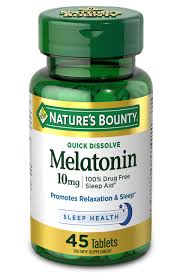The Benefits of Melatonin for Sleep
Many people struggle with sleep issues, whether it’s difficulty falling asleep, staying asleep, or experiencing poor quality sleep. One natural supplement that has gained popularity for its potential to improve sleep is melatonin.
Melatonin is a hormone produced by the pineal gland in the brain that helps regulate our sleep-wake cycle. It is often referred to as the “sleep hormone” because its levels typically rise in the evening as it gets dark, signaling to our body that it’s time to sleep.
Here are some key benefits of melatonin for sleep:
- Improves Sleep Quality: Taking melatonin supplements can help improve the quality of your sleep by promoting relaxation and reducing the time it takes to fall asleep.
- Regulates Sleep-Wake Cycle: Melatonin can help regulate your body’s internal clock, making it easier to fall asleep at night and wake up feeling refreshed in the morning.
- May Help with Jet Lag and Shift Work: For those who travel frequently or work irregular hours, melatonin supplements may help adjust your sleep-wake cycle and reduce the effects of jet lag or shift work disorder.
- Natural and Non-Habit Forming: Unlike some prescription sleep medications, melatonin is a natural hormone that is not habit-forming and does not produce dependency when used appropriately.
It’s important to note that while melatonin can be effective for many people in improving their sleep quality, it may not work for everyone. It’s always best to consult with a healthcare provider before starting any new supplement regimen, especially if you have underlying health conditions or are taking other medications.
In conclusion, melatonin is a natural and safe option for improving sleep quality and regulating your sleep-wake cycle. If you’re struggling with insomnia or other sleep issues, consider incorporating melatonin supplements into your bedtime routine after consulting with a healthcare professional.
Melatonin for Sleep: Answers to 9 Common Questions
- What is melatonin and how does it work for sleep?
- Is melatonin safe for long-term use?
- How much melatonin should I take to improve my sleep?
- Can melatonin help with insomnia?
- Are there any side effects of taking melatonin for sleep?
- Does melatonin interact with other medications or supplements?
- Is melatonin suitable for children or older adults?
- Can I become dependent on melatonin for sleep?
- Are there natural alternatives to melatonin for improving sleep?
What is melatonin and how does it work for sleep?
Melatonin is a natural hormone produced by the pineal gland in the brain that helps regulate our sleep-wake cycle. Often referred to as the “sleep hormone,” melatonin levels typically rise in the evening as it gets dark, signaling to our body that it’s time to sleep. This hormone plays a crucial role in promoting relaxation and reducing the time it takes to fall asleep. By supplementing with melatonin, individuals can support their body’s natural sleep processes and improve overall sleep quality. It helps regulate the internal clock, making it easier to fall asleep at night and wake up feeling refreshed in the morning.
Is melatonin safe for long-term use?
Melatonin is generally considered safe for short-term use, but there is limited research on its long-term effects. While some studies suggest that melatonin is well-tolerated and non-habit forming, more research is needed to determine its safety for extended use. It’s important to consult with a healthcare provider before using melatonin as a long-term sleep aid, especially if you have underlying health conditions or are taking other medications. Monitoring your response to melatonin and discussing any concerns with a healthcare professional can help ensure its safe and effective use over an extended period.
How much melatonin should I take to improve my sleep?
Determining the right dosage of melatonin to improve sleep can vary for each individual based on factors such as age, weight, and overall health. It is generally recommended to start with a low dose, typically between 0.5 to 3 milligrams, taken about 30 minutes to an hour before bedtime. It’s important to assess how your body responds to this initial dosage and adjust accordingly. Consulting with a healthcare provider or a sleep specialist can provide personalized guidance on the appropriate melatonin dosage for your specific sleep needs and goals.
Can melatonin help with insomnia?
Research suggests that melatonin can be beneficial in managing insomnia for some individuals. Melatonin, known as the “sleep hormone,” plays a crucial role in regulating the sleep-wake cycle. Supplementing with melatonin may help improve sleep quality, reduce the time it takes to fall asleep, and regulate the body’s internal clock. However, it’s important to consult with a healthcare provider before using melatonin for insomnia, as individual responses to the supplement can vary. Additionally, addressing underlying causes of insomnia, such as stress, lifestyle habits, or medical conditions, is essential for comprehensive treatment.
Are there any side effects of taking melatonin for sleep?
When considering the use of melatonin for sleep, it is important to be aware of potential side effects that may occur. While melatonin is generally considered safe for short-term use, some individuals may experience side effects such as daytime drowsiness, headache, dizziness, and stomach discomfort. Additionally, melatonin supplements may interact with certain medications or medical conditions, so it is advisable to consult with a healthcare provider before starting a melatonin regimen. Monitoring your response to melatonin and adjusting the dosage as needed can help minimize any potential side effects and optimize its benefits in improving sleep quality.
Does melatonin interact with other medications or supplements?
Melatonin has the potential to interact with certain medications or supplements due to its effects on the body’s sleep-wake cycle. It is important to consult with a healthcare provider before taking melatonin, especially if you are currently taking other medications or supplements. Some medications, such as blood thinners, immune suppressants, and diabetes medications, may interact with melatonin and affect their effectiveness. Additionally, certain supplements like sedatives or antidepressants may have additive effects when combined with melatonin. To ensure your safety and avoid any potential interactions, it is crucial to seek professional medical advice before incorporating melatonin into your daily routine.
Is melatonin suitable for children or older adults?
Melatonin is often used as a sleep aid for both children and older adults, but it’s important to use caution and consult with a healthcare provider before giving melatonin to these age groups. For children, melatonin may be recommended in certain cases of sleep disorders or jet lag, but the dosage and timing should be carefully monitored to avoid potential side effects. Older adults may also benefit from melatonin supplementation to improve sleep quality, but interactions with other medications and existing health conditions should be taken into consideration. It’s always best to seek medical advice to determine if melatonin is suitable and safe for children or older adults before incorporating it into their sleep routine.
Can I become dependent on melatonin for sleep?
Many people wonder whether they can become dependent on melatonin for sleep. The good news is that melatonin is not considered addictive or habit-forming like some prescription sleep medications. Since melatonin is a naturally occurring hormone in the body, supplementing with it is generally safe and non-addictive. However, it’s important to use melatonin as directed and not rely on it as a long-term solution for sleep issues. Consulting with a healthcare provider can help determine the appropriate dosage and duration of melatonin use based on individual needs and circumstances.
Are there natural alternatives to melatonin for improving sleep?
When looking for natural alternatives to melatonin for improving sleep, there are several options to consider. One popular choice is valerian root, a herb known for its calming effects and ability to promote relaxation. Another natural remedy is chamomile tea, which has soothing properties that can help reduce anxiety and prepare the body for sleep. Additionally, magnesium supplements have been shown to support healthy sleep patterns by relaxing muscles and promoting a sense of calm. Incorporating relaxation techniques such as meditation, deep breathing exercises, or gentle yoga before bedtime can also be effective in promoting better sleep without the need for melatonin supplementation. It’s important to explore these natural alternatives under the guidance of a healthcare provider to determine the most suitable option for your individual needs.




